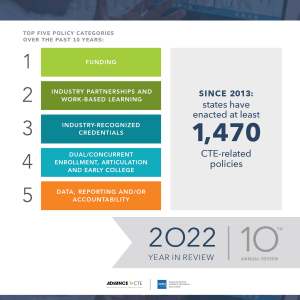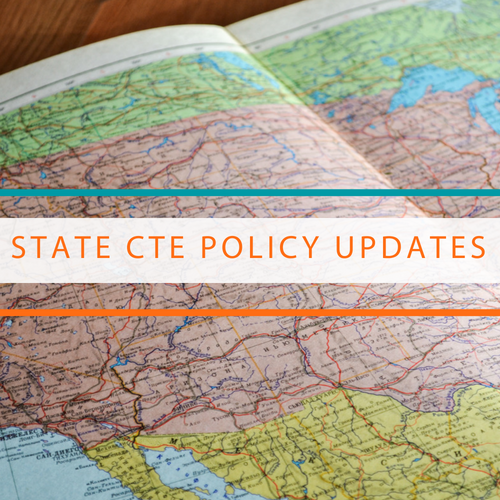This week top congressional leaders continued to try and find consensus on the need to raise the nation’s statutory borrowing authority, while lawmakers in the House examined recent congressional budget requests from the Biden administration for the U.S. Department of Education (ED). Elsewhere, ED has proposed new rules for certain postsecondary programs and new priorities for competitive grants for Career Technical Education (CTE).
 Debt Limit Deadline Nears
Debt Limit Deadline Nears
For the last few weeks, congressional leaders and President Biden have been intensely debating whether and how to raise the nation’s statutory borrowing authority, known informally as the debt limit or debt ceiling. Current forecasts estimate that the federal government will breach this borrowing authority—which is intended to pay for debts Congress has already incurred—in early June. Failure to raise the debt limit would have catastrophic consequences for the nation’s economy. This week, lawmakers continued to meet and negotiate but have made little progress.
More recently, these discussions have been limited to senior staff representing the Biden administration and House Speaker Kevin McCarthy—a development that has been widely viewed to mean that these discussions are narrowing a potential set of issues that could compose a compromise. These issues reportedly include a number of Republican priorities including permitting reform, work requirements for social safety net programs and, of particular note for the CTE community, potential caps on the overall size of the federal budget for the next several years. As shared previously, House Republicans are insisting on concessions from Democrats on these topics in exchange for raising the debt limit. As of this writing, these discussions remain extremely fluid.
Advance CTE is closely monitoring this situation and related developments, particularly for the potential impacts it may have on CTE and the Carl D. Perkins Career and Technical Education Act as amended by the Strengthening Career and Technical Education for the 21st Century Act (Perkins V).
Secretary Cardona Testifies in the House
On Tuesday, May 16, the House Education and Workforce Committee held a hearing examining the U.S. Department of Education’s (ED) federal fiscal year 2024 (FY24) budget request and related priorities. U.S. Secretary of Education Miguel Cardona testified before the panel regarding a wide range of topics including recently proposed Title IX rules, critical race theory, parent’s rights and many other hot-button education issues. While lawmakers on both sides of the aisle disagreed on many of these issues, the need to reform postsecondary financial aid policies– primarily by expanding federal Pell Grant eligibility for shorter-term, high-quality postsecondary CTE programs– was a rare area of agreement which was also echoed by Secretary Cardona. Advance CTE has also long championed legislation that would achieve this.
During the hearing, Rep. Joe Courtney (D-CT) highlighted a recent visit he and Secretary Cardona made to a local CTE high school noting that “. . . they are turning away hundreds of kids who would love to take advantage of the benefit of career and technical education” due to a lack of capacity and related resources. Rep. Courtney highlighted the importance of formula funding for Perkins V, which he noted the administration has proposed to increase by $43 million in FY24. Despite this encouraging aspect of the President’s budget request, ED has also requested $200 million in funding for the creation of a new competitive grant program. Advance CTE and partners have previously shared concerns regarding this proposal, which ED estimates would only serve 32 programs in total, particularly given growing demand for CTE programs across the country. An archived webcast of the hearing, including opening statements, can be found here.
ED Outlines Priorities for Perkins I&M Grants
On Monday, ED published proposed priorities for Perkins V’s Innovation and Modernization (I&M) grant program. Last year, Congress provided an additional $25 million for Perkins V’s I&M account to advance innovative approaches to delivering CTE programs. The priorities proposed by the Department include career advisement and counseling, dual and concurrent enrollment, work-based learning and industry-recognized credentials. These priorities align with ED’s wider “Career Connected High Schools” initiative, which is conceived using these same priority areas. As mentioned elsewhere, ED has been seeking an additional $200 million for this initiative in the ongoing FY24 appropriations process. ED is inviting feedback on these priorities for the next 30 days. More information can be accessed here.
ED Proposes New Gainful Employment Rule
Earlier today, ED proposed a new and highly-anticipated “gainful employment” (GE) rule as part of a wider package of other postsecondary regulations recently negotiated by the department and other stakeholders last year. The regulations would apply to certain postsecondary career education programs and determine their eligibility for federal student financial aid from Title IV of the Higher Education Act (HEA) based on programs meeting certain performance standards related to graduates’ earnings and ability to pay back student loans. Earlier iterations of this rule were first proposed by the Obama administration over a decade ago and finalized in 2014 which were later rescinded by the Trump administration a few years later after a series of legal challenges.
This newly proposed GE rule would require certain postsecondary programs to demonstrate that at least half of their graduates earn higher wages than a typical high school graduate in their state within a three-year period. The rule would also apply a debt-to-earnings ratio, similar to previous versions of GE rules, which would require a graduate’s debt to amount to no more than eight percent of a graduate’s overall earnings and no more than 20 percent of their discretionary income. Programs would be evaluated using both of these performance measures and those that fail to meet these thresholds twice within three years, would lose access to federal student aid funding derived from HEA. Based on this current timeline, ED is likely to promulgate a final GE rule by November 1, 2023, which could take effect July 1, 2024.
In addition, ED is also proposing supplementary data collections from all postsecondary institutions and programs, including those not covered by GE, to develop a new website providing learners and families with more information regarding these programs. This proposal is related to a recent request for information from ED earlier this year regarding the potential creation of a list of “low financial value” postsecondary programs. The regulatory package also includes changes to existing ability-to-benefit rules, which govern how learners without a high school diploma can qualify for federal student aid as they pursue postsecondary education. Currently, this rules package is open for public review and feedback until June 20, 2023.
Steve Voytek, Policy Advisor



 State education agencies, legislators and educators faced significant challenges from
State education agencies, legislators and educators faced significant challenges from